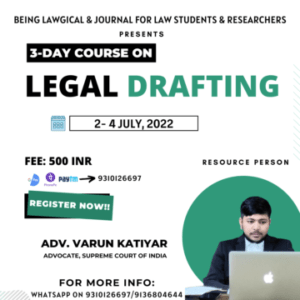Certificate Course on Key Elements in appreciation of evidence by Marathwada Mitra Mandal’s Shankarrao Chavan Law College
About the course
The law of evidence assumes great importance in the legal profession as it offers the best possible way to the court to draw an inference and render the decision. Understanding this important branch of the law becomes difficult due to differences in theory and practice. This course intends to focus on practical aspects of the subject so as to impart effective training regarding key elements in the appreciation of evidence.
Objectives
This course is useful for undergraduate students, young lawyers, and others having an interest in law and is designed to achieve the following specific objectives –
- To understand the role, structure, fundamentals and importance of the law of evidence.
- To understand the pivotal role of the law of evidence in any judicial proceedings.
- To understand the law of evidence and principles of appreciation of evidence from a practical perspective.
Course Content
Module I- Introduction, important concepts and scheme of the Act
- Meaning, nature and scope of evidence, importance of evidence in judicial proceedings
- Important definitions in interpretation clause
- Classification of evidences:-
- Oral and Documentary evidence
- Direct and Indirect evidence
- Corroborative and Substantive evidence
- Expert evidence
- Forensic evidence
- Witnesses
- Who can testify- competency and compellability of witnesses
- Types of witnesses
- Eye witnesses
- Interested witnesses
- Hostile witnesses
- Child witnesses
- Attesting witnesses
- Accomplice
Module II- Relevancy of facts
- Relevancy, admissibility and weight of evidence
- Res Gastae and hearsay evidence
- Admissions and confessions
- Statement by persons who cannot be called as witnesses
- Statement made under special circumstances
- Nature, scope and limitations of expert evidence
- Relevancy of character
Module III- On Proof
- Facts which need not be proved
- Oral evidence
- Documentary evidence- Primary and Secondary evidence
- Evidence relating to electronic records
- Public documents
- Presumptions as to documents
- Exclusion of oral evidence by documentary evidence
Module IV- Production and effect of evidence -of Burden Proof, of Witnesses
- Proof beyond reasonable doubt in Criminal Trial – Concept, illustrations
- Preponderance of probability in civil case
- Burden of Proof and Onus Probandi
- Marking and exhibiting documents
- Evidentiary value of voice recording
- Rule of Estoppel : Nature, scope and kinds
Module V- The examination of witnesses
- Procedure for Examination of
- Child witness
- Rape Victim
- Dumb witness
- Privileged communication
- Evidence of accomplice
- Kinds and order of examination of witnesses
- Nature, scope and examination of witnesses
- Leading questions -scope and limitations
- Art of cross examination and role of courts in cross examination
- Corroboration
*The contents mentioned in the module will be adjusted and covered in the topics with their due weightage as per the discretion of the lectures.
Course Duration
One month (30 Hrs), Course starts from 1st week of March 2022
Eligibility
The student who is pursuing or has completed law graduation
Fees
Rs.2500/- only
Mode of Conduct
Online
To register, use the link: https://forms.gle/B4BY2mqfUnPA9vdy8
For detail content of the course click here-https://drive.google.com/file/d/1nvcLILOLyg6COtDBBnkpEHdrjEn8sZON/view?usp=sharing
For more information, write to us at: calrt@sclc.edu.in
For queries contact on
9403776852/9881712873
+919403776852/+918007951212
Previous Posts
Webinar on Evolution of Space Law And Its Importance
DME International Moot Court Competition
DME Law School International Conference




